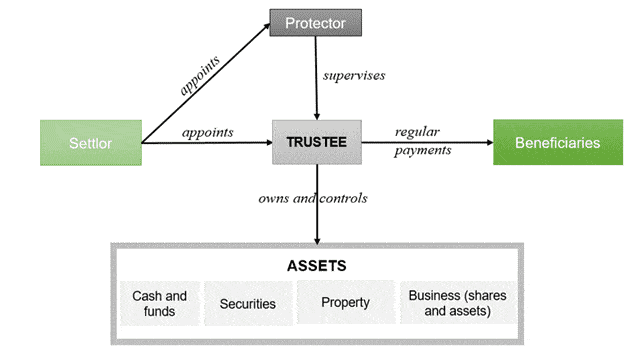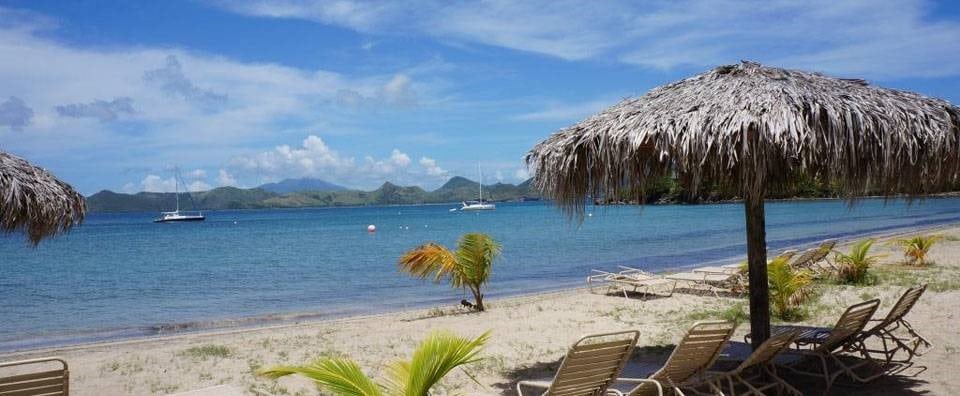Nevis Trust
Strongest Global Asset Protection
Nevis stands out as a premier destination for offshore asset protection trusts, offering unparalleled legal safeguards. Its well-established regulatory framework provides a secure environment for affluent individuals and families engaging in international business, investment, and banking.
International Trust in Nevis
10 Key Benefits
A Nevis Exempt Trust is a type of offshore trust established in Nevis, a Caribbean island that is part of the Federation of St. Kitts and Nevis. These trusts are popular in asset protection planning because of the jurisdiction’s favorable legal framework. Here are some of the primary advantages of establishing a Nevis Exempt Trust:

1. Strong Asset Protection
• Legal Protections: Nevis has a strong reputation for asset protection. The jurisdiction offers robust legal protections against creditors, including a prohibition on foreign judgments being enforced in Nevis.
• Creditor Protection: In a Nevis Exempt Trust, there are protections against creditors seeking to seize assets. If a creditor attempts to challenge the trust, they face strict legal hurdles. For example, there is a two-year limitation on claims after the creation of the trust.
2. Confidentiality
• Privacy: Nevis trusts offer a high degree of confidentiality. The details of the trust (such as the settlor, beneficiaries, and assets) are not publicly disclosed. There is no public registry of trusts, so the assets and the structure remain private.
• Minimal Reporting Requirements: There are limited reporting obligations compared to many other jurisdictions, making Nevis an attractive option for those seeking discretion.
3. Flexibility in Terms
• Wide Range of Asset Types: Nevis Exempt Trusts can hold various types of assets, including real estate, investments, and business interests.
• Flexible Trust Structures: The settlor has the flexibility to structure the trust according to their specific needs, including the terms for distribution, duration, and the appointment of trustees.
4. Tax Benefits
• No Tax on Trust Income or Capital Gains: Nevis does not impose taxes on income or capital gains for offshore trusts, making it an attractive location for those looking to minimize tax liabilities. However, beneficiaries may still be subject to tax in their home jurisdictions.
• No Inheritance or Estate Taxes: Nevis does not have inheritance or estate taxes, which can be beneficial for estate planning.
5. Stability and Reputation
• Political and Economic Stability: Nevis is known for its political stability and favorable business environment, which enhances the security of assets placed in a trust there.
• Established Legal Framework: Nevis has a well-established legal system based on English common law, which provides clarity and predictability in trust administration.
6. Protection from Forced Heirship Rules
• Freedom from Forced Heirship Laws: In some countries, forced heirship laws dictate that a portion of a deceased person’s estate must go to certain heirs. Nevis does not have these forced heirship rules, giving the settlor more freedom in how they wish to distribute their estate.
7. Easy Setup Process
• Quick Formation: Establishing a Nevis Exempt Trust can be relatively straightforward and can be completed quickly with the help of a qualified service provider. This efficiency makes it a convenient option for international clients.
• Minimal Government Oversight: Nevis has a streamlined process for trust formation and minimal bureaucratic hurdles, making the jurisdiction user-friendly for international clients.
8. Protections Against Foreign Divorce
• Divorce Protection: If a settlor or beneficiary is involved in a divorce in another jurisdiction, Nevis offers legal protections that help shield the trust assets from being divided in the divorce proceedings, depending on the circumstances.
9. Trustee Flexibility
• Choice of Trustees: The settlor can choose from a variety of professional trustees, and it is possible to appoint a family member or trusted advisor, which allows for more personalized management of the trust.
10. No Reporting of Beneficiaries
• No Requirement to Report Beneficiaries: Unlike some other jurisdictions that may require reporting of the trust’s beneficiaries to local authorities, Nevis does not require this, further enhancing privacy.
Nevis Exempt Trust
Nevis Structure

A Nevis trust is a private fiduciary arrangement, formalized through a “Deed of Trust,” which establishes a legal relationship between the Settlor (or Founder) and the Trustee. Other parties involved include one or more Beneficiaries and, optionally, a Protector. This agreement must be documented in writing and properly witnessed or notarized.
The Settlor creates the trust by transferring assets to the Trustee, who is responsible for managing them for the benefit of the Beneficiaries.
The Trustee(s), appointed by the Settlor, is tasked with preserving the trust, administering its assets, and ensuring that the interests of the Beneficiaries remain a priority, in accordance with the Deed of Trust. The primary Trustee overseeing the administration must be a Nevis trust company or a Nevis-registered legal entity. Additional trustees may be appointed with designated roles, such as investment management, and they can be based anywhere in the world.
A Protector serves as an overseer, ensuring that the Trustee complies with the Trust Deed. Under the governing Ordinance, the Protector is authorized to monitor trust operations, ensuring that the trust’s purpose is upheld. Recent amendments have clarified the Protector’s authority, allowing them to instruct Trustees regarding distributions or investment decisions. Furthermore, the Trustee is legally protected when following the Protector’s directions, except in cases of intentional misconduct.
The governing law of the trust is determined by the jurisdiction explicitly stated in the trust document. If none is specified, the applicable law is that of the jurisdiction with the closest connection to the trust at the time of its establishment. If neither criterion applies, Nevis law will govern the trust.
The Ordinance also upholds confidentiality regarding matters of trust. Although an international trust register exists, it only contains the trust’s name and date of settlement. This register is not open to public scrutiny, unless a Trustee grants written permission for a specific trust entry to be inspected.
However, in compliance with AML/CFT (Anti-Money Laundering and Countering the Financing of Terrorism) regulations, the Registered Agent responsible for trust registration must maintain accurate and updated records on clients and any third parties they represent. This includes details of the Settlor and Beneficiaries. Additionally, the Ordinance mandates that all non-criminal legal proceedings related to an international trust must be conducted privately, and any disclosure of case details requires court approval.
Beneficiaries are the individuals entitled to benefits from the trust, as determined by the Settlor and outlined in the Deed of Trust.
The Trust Deed itself serves as the foundational document, defining the trust’s purpose, the roles and responsibilities of Trustees and the Protector, and the conditions governing asset distribution.
A Settlor may also be designated as a Beneficiary.
Registration procedure
The registration of a Trust must be carried out by a registered agent, such as an attorney or local management company. The registration may be achieved in twenty-four (24) hours.
An application for entry on the register of International Trusts shall be made in a manner and form prescribed by the Registrar.
The application shall be accompanied by:
• Notice of the name and registered office of the Trust.
• Undertaking that Trust document has been read and it conforms with NIETO (Nevis International Exempt Trust Ordinance).
• Name of the Trustee: one of the trustees has to be a corporation incorporated under the NBCO or a trust company doing business in Nevis.
• A certificate from a trustee company, a barrister or solicitor certifying:
• That the trust upon registration will be an international trust;
• The date on which the Trust was created, settled or established.
Nevis International Exempt Trust
Key Features

Official Name: Nevis International Exempt Trust
Governing Legislation: 1994 International Exempt Trust Ordinance
Legal System: Based on Common Law
Duration: Unlimited (No perpetuity restrictions)
Re-domiciliation: Permitted
Protector Role: Allowed
Trustee Requirements: At least one trustee is required, who must be either a Nevis-incorporated entity or an individual
Trust Deed: Confidential (Not publicly filed)
Local Presence: A registered office in Nevis is mandatory
Annual Reporting: No filing or reporting obligations
Statute of Elizabeth: Not applicable
Forced Heirship Laws: Not applicable
Legal Claims: Fraudulent transfer claims must be filed within 1–2 years
Recognition of Foreign Judgments: Not enforceable in Nevis courts
Taxation: Fully exempt from Nevis taxes
Limitations: The Settlor and Beneficiaries must not be residents of St. Kitts & Nevis; local real estate cannot be held within the trust
Frequently Asked Questions
Key Features of a Nevis Trust
The Nevis International Exempt Trust has provided strong asset protection, confidentiality, and tax advantages since 1994. It facilitates smooth wealth succession while operating within a business-friendly regulatory environment that prioritizes privacy and financial security.
Who Can Help Establish a Nevis Trust?
To set up a Nevis Trust efficiently, it is advisable to seek guidance from professionals well-versed in Nevis trust laws. Experienced firms, such as TBA & Associates, along with qualified trust attorneys in your home country, can collaborate to ensure a seamless process. Initially, reaching out to TBA & Associates for a consultation is recommended.
Can a Citizen of St. Kitts and Nevis Establish a Nevis Trust?
A Nevis Trust can be established by individuals from any country, provided they are not subject to applicable economic sanctions. Citizens of St. Kitts and Nevis are eligible to create an Exempt Trust. However, certain restrictions apply:
• The settlor and beneficiaries cannot be residents of Nevis.
• The trust cannot hold real estate located within St. Kitts and Nevis.
Is a Lawyer Required to Set Up a Nevis Trust?
Creating an international trust involves legal and financial complexities, making professional guidance essential. Consulting with a lawyer in your home country who specializes in international tax planning and asset protection is highly recommended. Additionally, experienced Trust and Estate Practitioners can assist with the necessary arrangements, including drafting the Trust Deed and ensuring compliance with Nevis trust regulations.
Set up your Business Entity today!
Our Business Development Team is ready to guide and assist you to discuss all options you have and to provide you with all the support you need to enable you to take the right decision facing your specific needs!
All our Consultancy and Advisory services are completely FREE!
Packages and Prices!
Inclusions
Year 1 Incorporation and service fees.
Optional Services (Bank Account opening, Nominee services, Certification of documents, amongst others).
Annual Renewal service fees for year 2 and subsequent years, to keep your company in good standing and full Compliant at all times.